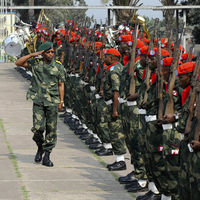KINSHASA, Congo -- The local residents had been waiting for hours, and there was no guarantee they'd get in to the poorly lit room where administrators from the Forces Armées de la République Democratique du Congo (FARDC) were busy filling out paperwork. The U.S. Army and the FARDC were trying to register the Congolese civilians for a free health clinic that would take place the following week. The clinic, administered by military medical personnel from both countries, would be one of the culminating events of a two-week, U.S.-led exercise meant to improve the FARDC's medical capabilities -- all part of the "soft power" strategy advanced by U.S. Africa Command, based in Germany.
But outside the gate, scores of Congolese people still sat on curbs or milled around. Some had been there for hours trying to get registered, with no luck. Their conditions were either not severe enough, or too severe for clinic treatment -- or else they just couldn't shove their way past the guard at the gate. It was late morning and the number of people already registered was nearing the FARDC-imposed limit of 2,000 cases. Any more than that and the medical staff could be overwhelmed, U.S. Army Maj. Junel Jeffrey told World Politics Review. The disappointed Congolese muttered under their breaths.
The U.S. Army had come to Congo in part to win hearts and minds. Turning away patients meant possibly alienating the very people the Americans were hoping to befriend. In underestimating the sheer depth of need in Congo, the Army could appear fickle, even cruel. The sick and injured who responded to the advertisements offering free medical care would instead discover that there wasn't nearly enough care to go around.

